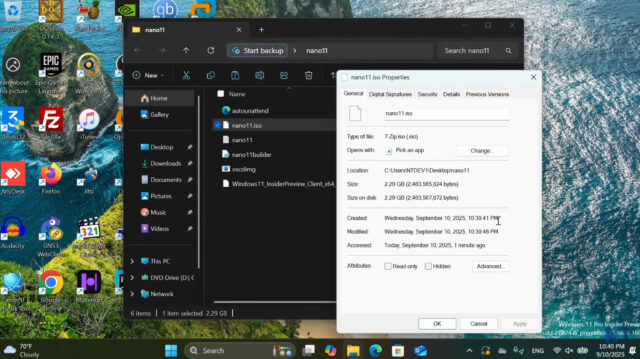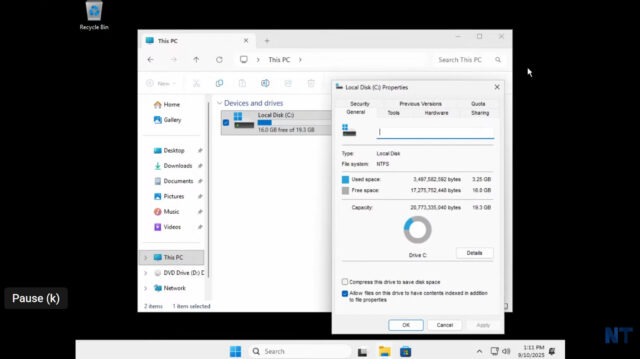Forget Tiny11, Nano11 takes Windows 11 debloating to the next level

Fans of debloating Windows now have another tool to experiment with. NTDEV, the developer behind the well known Tiny11 project, has created Nano11 Builder, a PowerShell script that hacks Microsoft’s operating system down even further.
While Tiny11 already produced a lighter and more flexible alternative to the full-fat Windows 11 install, Nano11 takes things to the extreme by automating the creation of an installer image that is a fraction of the original size.
SEE ALSO:
- The brilliant Windows 12 is everything Windows 11 isn't -- and the Microsoft OS we deserve
- This updated Windows 11 clone is Linux underneath and makes your old PC run faster -- get it now
- Say 'no thanks' Microsoft Windows 11 and 'yes please' to AnduinOS 1.3
- First release of Kodi 22 'Piers' is available to download NOW
The goal is to provide developers and testers with a streamlined environment that contains only the bare essentials. It isn’t something for every day use, but in tests it seems to work well.
Nano11 Builder, which you can access here, works by relying on Microsoft’s own DISM capabilities and the official oscdimg.exe tool, both of which are used to produce a bootable ISO.

The process removes virtually everything that can be stripped away from Windows 11. Bloatware such as Clipchamp, Xbox, and Solitaire get the chop, but the pruning goes way, way deeper.
Core system elements, including the Windows Component Store, Windows Update, and Windows Defender get hacked out, as do Internet Explorer, Microsoft Edge, OneDrive, language packs, accessibility tools, and most system services.
Even audio support gets removed, proving the project’s focus on extreme minimalism rather than daily usability.

Nano11 issues
Because so much of Windows 11 gets discarded by the script, the resulting system comes with inevitable major trade offs.
Images created with Nano11 Builder cannot be updated or expanded with new features, drivers, or languages.
Security features are gone, as are common utilities that you would expect to see in a standard installation.
NTDEV makes it clear that Nano11 is 100 percent experimental and should only be used for testing, embedded use cases, or running small virtual machines where stability and serviceability are not especially important.
In terms of size, NTDEV demonstrated how a standard Windows 11 ISO of 7.04GB could be reduced to just 2.29GB. For the Long Term Servicing Channel edition, the installed footprint can shrink to as little as 2.8GB.
The project is open source, so potentially anyone can download, modify, and adapt the script to their own needs.
You can view the debloating script in action in the video below.
What do you think about Nano11 Builder? Let us know in the comments.
